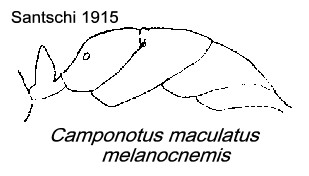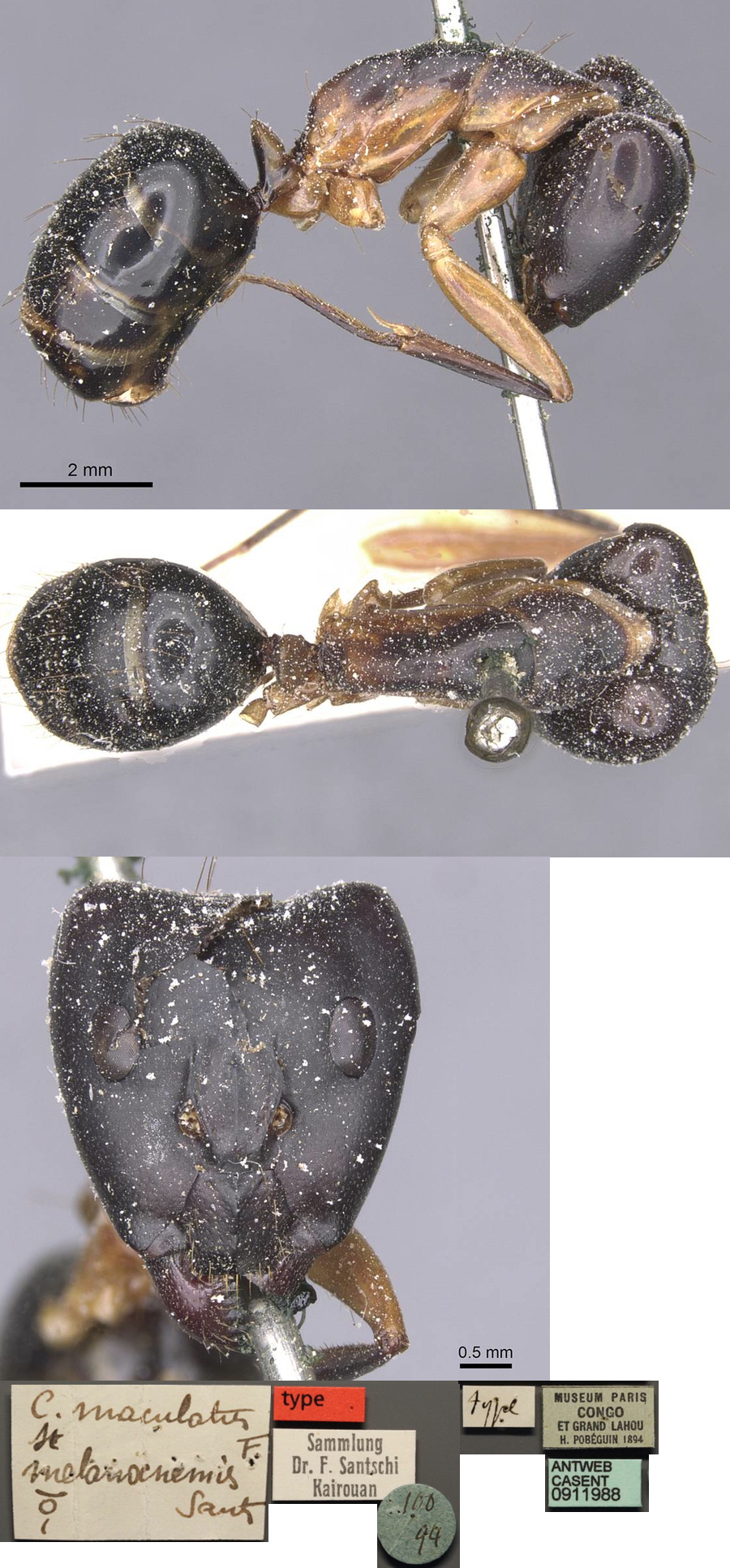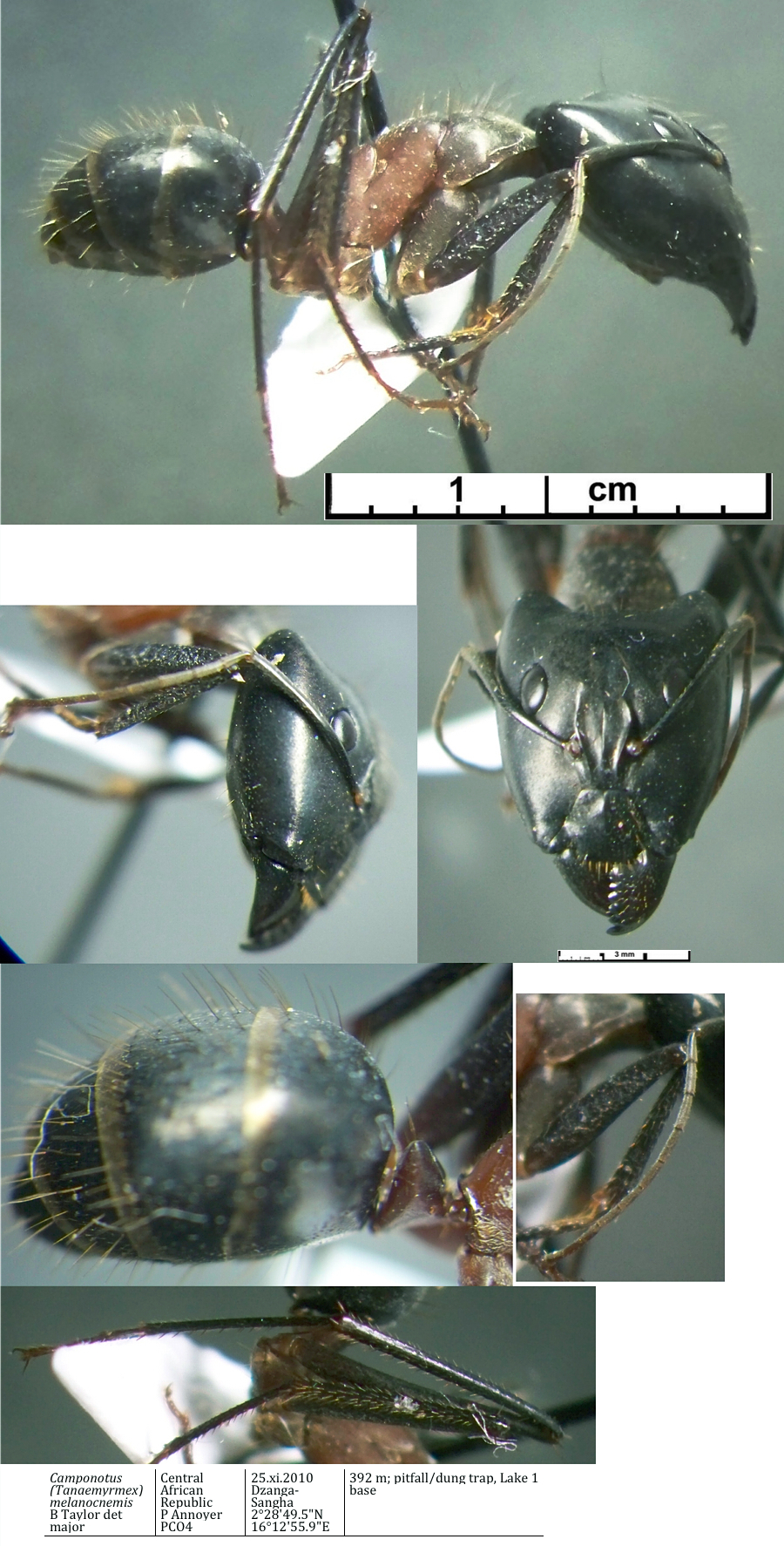Camponotus (Tanaemyrmex) melanocnemis Santschi -
new
status
  Type location Congo
(Camponotus maculatus
Fabr. var. melanocnemis nov.
Santschi, 1911c: 368, major worker) Grand Lahou,
by H. Pobéguin, Museum de Paris - see below Type location Congo
(Camponotus maculatus
Fabr. var. melanocnemis nov.
Santschi, 1911c: 368, major worker) Grand Lahou,
by H. Pobéguin, Museum de Paris - see below
junior synonym schultzei (Camponotus
(Myrmoturba) maculatus F. var. Schultzei n. var.,
Santschi, 1915c: 278, major worker: raised to subspecies by
Forel, 1915, with its junior synonym schultzei,
Forel, 1912j : 179, major & minor workers & male) from Uganda, Entebbe, 03.1912 - no images
on Antweb (October 2014).  . .
|
 Santschi (1911c) had
the
major as - differing from the type (maculatus) by
the darker colour of the gaster patches, which are brownish-black;
sometimes the gaster is entirely black, the tibiae brown-black; the
sculpture is slightly shinier on the posterior angles of the head; the
dorsum of the propodeum is slightly longer. Santschi (1911c) had
the
major as - differing from the type (maculatus) by
the darker colour of the gaster patches, which are brownish-black;
sometimes the gaster is entirely black, the tibiae brown-black; the
sculpture is slightly shinier on the posterior angles of the head; the
dorsum of the propodeum is slightly longer.
Santschi (1915c) described melanocnemis - this
race is very close to the type in general form. The head is a little
larger and the frontal carinae slightly further apart, The thorax
profile is as arcuate, but somewhat more robust and the propodeum is
larger. The posterior tibiae are longer, more than 4 mm. The sculpture
is as matt as the type on the head and thorax, but the sides of those
parts are generally more shiny. The brown-red pilosity is translucent
on the head, otherwise as the type. The overall colour is always
darker; with the posterior edges of the thorax and gaster,
except for
the patches, black or nearly so, although the narrow yellow border
persists as in the type; yellow ochre parts of legs are less extended,
the tibiae and tarsi are more or less brown black. The patches on the
gaster are much more reduced, sometimes absent, The male is black
leading to the conclusion that this is a sub-species - in the type the
male is yellow with brown patches.
The minor has the head black or dark brown-red; the gaster is black,
sometimes basally spotted; the tibiae and dorsal thorax are darker but
sometimes ochre in the smallest workers. Head slightly longer than the
type and slightly wider anteriorly, with sides straight forward of the
eyes and less convex behind, with a distinct occipital border. Thorax
profile less convex than type and than in desantii.
Petiole scale lower. Specimens from Zaïre
- Oubangi, by Rev. P. Augustin; also from Congo,
Grand Lahou, by H. Pobéguin. Santschi (1915c) also notes on lohieri
(above) as a variety with the patches rather clearer and more apparent,
but smaller; except for the base and upper part of the first gastral
segment with is more or less yellow ochre, the sculpture is less shiny.
Specimens from Ivory Coast, Jacqueville by Lohier;
types from Benin, Upper Dahomey, Kouandé, by Desanti; also from
Saõ
Thomé, by Gravier; and Senegal, by J.de Gaulle. |
Santschi's (1915c) description is at  .
Arnold (1922) gave a
translation/description which is at .
Arnold (1922) gave a
translation/description which is at  ,
according to Arnold, the specimens from Bulawayo, Zimbabwe were
determined as melanocnemis
Santschi but were slightly smaller than the
type form. Forel's (1911j) description of schultzei is at ,
according to Arnold, the specimens from Bulawayo, Zimbabwe were
determined as melanocnemis
Santschi but were slightly smaller than the
type form. Forel's (1911j) description of schultzei is at 
|
 The
photomontage of the type major worker is collated from http://www.antweb.org/specimen.do?name=casent0911988. The
photomontage of the type major worker is collated from http://www.antweb.org/specimen.do?name=casent0911988.
|
Oxford University Museum
specimens - all perhaps too large to be this species
Camponotus (Tanaemyrmex) melanocnemis
B Taylor det.
minor
|
Central African
Republic
P Annoyer
DC
|
14.i.2005
Dzanga-Sangha
04°22’19.4" N
18°35’49.7" E
|
U.V : 19h-7h,
Bangui, après la corniche; 360m asl
|
2
|
 |
Camponotus (Tanaemyrmex) melanocnemis
B Taylor det.
major |
Central African
Republic
P Annoyer
PCO4
|
25.xi.2010
Dzanga-Sangha
2°28'49.5"N
16°12'55.9"E
|
392 m; pitfall/dung
trap, Lake 1 base
|
1
|
 |
Camponotus (Tanaemyrmex) melanocnemis
B Taylor det.
major |
Central African
Republic
P Annoyer
PCO1
|
25.xi.2010
Dzanga-Sangha
2°28'49.5"N
16°12'55.9"E
|
392 m; pitfall/dung
trap, Lake 1 base
|
1
|
 |
Camponotus (Tanaemyrmex) melanocnemis
B Taylor det.
major |
Liberia
E Poirier
Yekepa Camp 4
SLAM 2
|
6.iv.2013
Nimba County
07°33’04" N
08°33’17" E
|
SLAM trap
Floodplain & marsh
501 m asl
major
|
1
|
 |
|
 The
photomontage of what it appears may well be a major of melanocnemis
is of a specimen from the Central African Republic,
Dzanga-Sangha;
collector Philippe Annoyer (CAR PCO1). The
photomontage of what it appears may well be a major of melanocnemis
is of a specimen from the Central African Republic,
Dzanga-Sangha;
collector Philippe Annoyer (CAR PCO1).
|
 The
photomontage of what it appears may well be a major of melanocnemis
is of a specimen from the Central African Republic,
Dzanga-Sangha;
collector Philippe Annoyer (CAR PCO4). The
photomontage of what it appears may well be a major of melanocnemis
is of a specimen from the Central African Republic,
Dzanga-Sangha;
collector Philippe Annoyer (CAR PCO4).
|
 The
photomontage of what it appears may well be a minor of melanocnemis
is of a specimen from the Central African Republic, Bangui,
après la corniche;
collector Philippe Annoyer (CAR DC). The
photomontage of what it appears may well be a minor of melanocnemis
is of a specimen from the Central African Republic, Bangui,
après la corniche;
collector Philippe Annoyer (CAR DC).
|
|